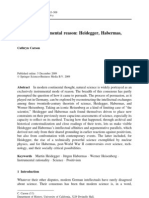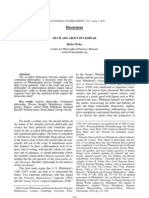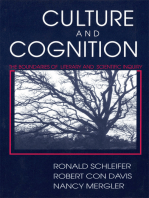Bergson and Whitehead Some Cross-Elucid PDF
Bergson and Whitehead Some Cross-Elucid PDF
Uploaded by
Perched AboveCopyright:
Available Formats
Bergson and Whitehead Some Cross-Elucid PDF
Bergson and Whitehead Some Cross-Elucid PDF
Uploaded by
Perched AboveOriginal Title
Copyright
Available Formats
Share this document
Did you find this document useful?
Is this content inappropriate?
Copyright:
Available Formats
Bergson and Whitehead Some Cross-Elucid PDF
Bergson and Whitehead Some Cross-Elucid PDF
Uploaded by
Perched AboveCopyright:
Available Formats
Bergson and Whitehead:
some cross-elucidations
Weber@Chromatika.org
11th International Whitehead Conference “Nature in Process: novel
approaches to Science and Metaphysics”, S2,
Universidade dos Açores, Ponta Delgada
The proximity that exists between the respective worldviews of Whitehead and Bergson is
often underlined. As a matter of fact, it is difficult to deny that both thinkers share the same
cultural background, the same concern for the philosophical relevance of XXth century
(relativistic) science and for its mathematical core, and a similar interest for common-sense,
the limitations of language, uncommon perceptions, religiosity, Post-Darwinian
lebensphilosophie, and pragmatism. Polymaths they most definitively were.
The outcome of their speculations is also strikingly similar : isn’t the “creative advance”
directly interpretable with the “élan vital” and vice-versa ? Moreover, their respective
understanding of consciousness (“durée” vs. “sense-awareness” and “pure perception” vs.
“subjective form of an intellectual feeling”) are clearly entangled with the psychophysical
concepts of threshold (Herbart, 1824) and the reflex arc theory (Hall, 1832).
In truth, every phenomenology presupposes an ontology, but sometimes one does not make
the right ontological requirements explicit. As a matter of fact, one single puzzle remains: the
difference of Whitehead and Bergson respective assessment of James’s late ontological
interpretation of Zeno. Both valued greatly James’s savage creative storms (to borrow Rilke’s
expression), but while the former adopted the bud theory of experience, the latter remained
uncompromisingly faithful to the continuity of the “durée.” Since only the bud theory can
arguably allow us to understand the ontological requirements of creativity and freedom
(continuity involves transformation, meta-morphosis, of existing materials, not creation), this
is by no means a subsidiary question. It thus seems likely that contrasting Bergson and
Whitehead leads us at a bifurcation: either we accept the epochal theory and Bergson’s liberty
qua creation is a fairy tale, or we stick to duration and some of the late Whitehead’s core
categories are idiosyncrasies factually useless outside of their genetic space.
You might also like
- The Natural Origin of Language: The Structural Inter-Relation of Language, Visual Perception and ActionFrom EverandThe Natural Origin of Language: The Structural Inter-Relation of Language, Visual Perception and ActionRating: 5 out of 5 stars5/5 (1)
- (Thought in The Act) Didier Debaise-Nature As Event - The Lure of The Possible-Duke University Press (2017)Document113 pages(Thought in The Act) Didier Debaise-Nature As Event - The Lure of The Possible-Duke University Press (2017)Anonymous grhFMpK1N100% (2)
- Dyczkowski, Mark S. G. - Kubjika The Erotic Goddess PDFDocument18 pagesDyczkowski, Mark S. G. - Kubjika The Erotic Goddess PDFPerched AboveNo ratings yet
- Ars Artium 06212024Document106 pagesArs Artium 06212024gkoptNo ratings yet
- Karl Lowith Nature History Existentialism PDFDocument16 pagesKarl Lowith Nature History Existentialism PDFTeo FifiNo ratings yet
- Being PhilosophyDocument13 pagesBeing Philosophyamar singhNo ratings yet
- The Phenomenology of Ontico-Ontological DifferenceDocument20 pagesThe Phenomenology of Ontico-Ontological DifferenceIvor HortonNo ratings yet
- Seminar Mahadevana CollegeDocument4 pagesSeminar Mahadevana CollegeRAJIB DEBNATHNo ratings yet
- 2Q:Klwhkhdgdqg'Hohx) H7Kh3Urfhvvri0Dwhuldolw/: Configurations, Volume 13, Number 1, Winter 2005, Pp. 57-76 (Article)Document21 pages2Q:Klwhkhdgdqg'Hohx) H7Kh3Urfhvvri0Dwhuldolw/: Configurations, Volume 13, Number 1, Winter 2005, Pp. 57-76 (Article)Alex DeLargeNo ratings yet
- Habermas, Heidegger and Berg Science As Instrumental ReasonDocument27 pagesHabermas, Heidegger and Berg Science As Instrumental ReasonJavier AguirreNo ratings yet
- Structuralism and Early Wittgenstein On MeaningDocument7 pagesStructuralism and Early Wittgenstein On MeaningmykhosNo ratings yet
- MichelWeber Much Ado 2011Document8 pagesMichelWeber Much Ado 2011infochromatikaNo ratings yet
- Relations of Analogy and IdentityDocument23 pagesRelations of Analogy and Identitycigsas1719No ratings yet
- Analogia Entis According To Brentano - MelandriDocument8 pagesAnalogia Entis According To Brentano - MelandriricardoangisNo ratings yet
- Karl Löwith - Nature, History, ExistentialismDocument16 pagesKarl Löwith - Nature, History, ExistentialismGiordano Bruno50% (2)
- Garlanding Science and Literature in A Single Thread: A TheoreticalDocument4 pagesGarlanding Science and Literature in A Single Thread: A TheoreticalRAJIB DEBNATHNo ratings yet
- Grounds For IonDocument5 pagesGrounds For IonresistancetotheoryNo ratings yet
- Biswanger HusserlDocument13 pagesBiswanger Husserlfeyza düşgünNo ratings yet
- Epicurean Thesis David HumeDocument5 pagesEpicurean Thesis David Humefc51eh59100% (1)
- Don Ihde - Expanding HermeneuticsDocument8 pagesDon Ihde - Expanding HermeneuticscanguropediaNo ratings yet
- Toward A History of Speech Act TheoryDocument30 pagesToward A History of Speech Act TheoryRenato Ulhoa100% (1)
- Leibniz Interpreted by HeideggerDocument19 pagesLeibniz Interpreted by HeideggerJames JoyceNo ratings yet
- Archimedes - DijksterhuisDocument16 pagesArchimedes - DijksterhuisDaniel LuizNo ratings yet
- Transdisciplinarity As Methodological Framework For Going Beyond The Science-Religion DebateDocument27 pagesTransdisciplinarity As Methodological Framework For Going Beyond The Science-Religion DebateIván DíazNo ratings yet
- Reflection PseudoscienceDocument3 pagesReflection PseudoscienceSuganthi RamasamyNo ratings yet
- Religions 12 00853 v2Document7 pagesReligions 12 00853 v2Arpan DeyNo ratings yet
- Heidegger and Re-Interpreting Logi PDFDocument9 pagesHeidegger and Re-Interpreting Logi PDFmansur hirbiNo ratings yet
- Cambridge University Press Harvard Divinity SchoolDocument13 pagesCambridge University Press Harvard Divinity Schoolcri28No ratings yet
- Not "Multiple Ontologies" But Ontic Capaciousness: Radical Alterity After The Ontological TurnDocument17 pagesNot "Multiple Ontologies" But Ontic Capaciousness: Radical Alterity After The Ontological TurnDiego BallesterosNo ratings yet
- THE PROBLEM OF TRUTH IN BAKHTIN'S THEORY MarksDocument14 pagesTHE PROBLEM OF TRUTH IN BAKHTIN'S THEORY MarksGustavo BritoNo ratings yet
- World PictureDocument32 pagesWorld PicturehkassirNo ratings yet
- Cadden2012 Albertus Magnus On Vacua in The Living Body PDFDocument18 pagesCadden2012 Albertus Magnus On Vacua in The Living Body PDFEsotericist MaiorNo ratings yet
- Betsy Van Schlun Science and The ImaginaDocument4 pagesBetsy Van Schlun Science and The Imaginacirebonvlog123No ratings yet
- Thought PlaceDocument128 pagesThought PlaceMennatallah M.Salah El DinNo ratings yet
- From Transcendental Egology to OrientatiDocument8 pagesFrom Transcendental Egology to OrientatieyupsuzgunNo ratings yet
- Culture and Cognition: The Boundaries of Literary and Scientific InquiryFrom EverandCulture and Cognition: The Boundaries of Literary and Scientific InquiryNo ratings yet
- Barnouw - Vico and The Continuity of ScienceDocument13 pagesBarnouw - Vico and The Continuity of Sciencejoao.m18No ratings yet
- Book Reviews: Alien Ocean: Anthropological Voyages in Microbial SeasDocument14 pagesBook Reviews: Alien Ocean: Anthropological Voyages in Microbial SeasSruti BasuNo ratings yet
- G Odel Meets Carnap: A Prototypical Discourse On Science and ReligionDocument10 pagesG Odel Meets Carnap: A Prototypical Discourse On Science and ReligionKupakwasheMtataNo ratings yet
- Recensión Al Historisches Wörterbuch Der Philosophie Que Explica Cambio Significado de TrascendentalDocument7 pagesRecensión Al Historisches Wörterbuch Der Philosophie Que Explica Cambio Significado de TrascendentalLuisNo ratings yet
- Phenomenology of Space and The Environment - Vergunst2018Document6 pagesPhenomenology of Space and The Environment - Vergunst2018Gonzalo BORQUEZ DIAZ100% (1)
- On The Difference Between Physics and Philosophical CosmologyDocument5 pagesOn The Difference Between Physics and Philosophical CosmologyotiumetbellumNo ratings yet
- MARTINDALE, Charles. Reedeming The Text In. Arion A Journal of Humanities and TheDocument32 pagesMARTINDALE, Charles. Reedeming The Text In. Arion A Journal of Humanities and ThegabrielvargasoficialNo ratings yet
- Chaos Bound: Orderly Disorder in Contemporary Literature and ScienceFrom EverandChaos Bound: Orderly Disorder in Contemporary Literature and ScienceRating: 3.5 out of 5 stars3.5/5 (3)
- Logical Math PsiDocument162 pagesLogical Math PsiRusuMarianNo ratings yet
- Berghahn Books The Cambridge Journal of AnthropologyDocument10 pagesBerghahn Books The Cambridge Journal of AnthropologyThiago TimNo ratings yet
- Karl Jaspers An Introduction To His PhilosophyDocument3 pagesKarl Jaspers An Introduction To His PhilosophyPetar DimkovNo ratings yet
- Review Article: Keywords: Epistemology, Historicity, Experimental Systems, Science As PracticeDocument24 pagesReview Article: Keywords: Epistemology, Historicity, Experimental Systems, Science As PracticeKarl AlbaisNo ratings yet
- Bergson and PhenomenologyDocument5 pagesBergson and PhenomenologyAntonie de ManNo ratings yet
- Existential PhenomenologyDocument44 pagesExistential PhenomenologyVimalNo ratings yet
- From Transcendental Egology To Orientation TheoryDocument8 pagesFrom Transcendental Egology To Orientation TheoryJoan Gonzalez GuardiolaNo ratings yet
- HALMAL 4v1Document12 pagesHALMAL 4v1alexcarloyNo ratings yet
- Adorno Subjective and Objective MeaningDocument14 pagesAdorno Subjective and Objective Meaningthomas hariyotoNo ratings yet
- David Carr Fenomenologia e RelativismoDocument16 pagesDavid Carr Fenomenologia e RelativismoAnonymous tdiiN75Hv6No ratings yet
- Deleuzian Time and PicnicDocument26 pagesDeleuzian Time and Picnicfeyza düşgünNo ratings yet
- Review of Wittgenstein S Poker The Story PDFDocument5 pagesReview of Wittgenstein S Poker The Story PDFw.ross.scott6185No ratings yet
- Religion After Metaphysics - Mark A. WrathallDocument204 pagesReligion After Metaphysics - Mark A. Wrathallsecreter2100% (1)
- FinalPaper SOCSCI GROUP1Document17 pagesFinalPaper SOCSCI GROUP1Franken JoseNo ratings yet
- Heidegger's Philosophy of Being: A Critical InterpretationFrom EverandHeidegger's Philosophy of Being: A Critical InterpretationRating: 3 out of 5 stars3/5 (1)
- InghDocument16 pagesInghPerched AboveNo ratings yet
- RatgDocument316 pagesRatgPerched AboveNo ratings yet
- Shabkar CatalogueDocument26 pagesShabkar CataloguePerched AboveNo ratings yet
- Soolot GytDocument157 pagesSoolot GytPerched Above100% (3)
- Celebrating Together The Inauguration of The: 16-21 MARCH 2021 Loma Bonita, Oaxaca, MexicoDocument3 pagesCelebrating Together The Inauguration of The: 16-21 MARCH 2021 Loma Bonita, Oaxaca, MexicoPerched AboveNo ratings yet
- As A Man Lives, So Shall He DieDocument8 pagesAs A Man Lives, So Shall He DiePerched AboveNo ratings yet
- Alchemical Manuscript Series V 12Document161 pagesAlchemical Manuscript Series V 12Carlos100% (3)
- 1 PB PDFDocument38 pages1 PB PDFPerched AboveNo ratings yet
- Franz Borkenau The Sociology of The Mechanistic World Picture PDFDocument19 pagesFranz Borkenau The Sociology of The Mechanistic World Picture PDFPerched AboveNo ratings yet
- Web Page Skip Company Approved List Details As of 19th June 2020Document2 pagesWeb Page Skip Company Approved List Details As of 19th June 2020Perched AboveNo ratings yet
- Workshop Simondon and Digital Culture PDFDocument7 pagesWorkshop Simondon and Digital Culture PDFPerched AboveNo ratings yet
- Explanatory Pluralism in Cognitive Science: Rick Dale, Eric Dietrich, Anthony ChemeroDocument4 pagesExplanatory Pluralism in Cognitive Science: Rick Dale, Eric Dietrich, Anthony ChemeroPerched AboveNo ratings yet
- Phenomenology. Pickering & Chatto 2014. 208 Pp. $150.00 USD (Hardcover ISBNDocument3 pagesPhenomenology. Pickering & Chatto 2014. 208 Pp. $150.00 USD (Hardcover ISBNPerched AboveNo ratings yet
- Mind As Process: Mark H. BickhardDocument15 pagesMind As Process: Mark H. BickhardPerched AboveNo ratings yet
- Garth Fowden - The Egyptian Hermes - A Historical Approach To The Late Pagan Mind-Princeton University Press (1993) PDFDocument276 pagesGarth Fowden - The Egyptian Hermes - A Historical Approach To The Late Pagan Mind-Princeton University Press (1993) PDFBenoit Loeuille100% (6)
- Logical Atomism and The Beginnings of Pluralist EmpiricismDocument6 pagesLogical Atomism and The Beginnings of Pluralist EmpiricismPerched AboveNo ratings yet
- Explanatory Pluralism in Cognitive Science: Rick Dale, Eric Dietrich, Anthony ChemeroDocument4 pagesExplanatory Pluralism in Cognitive Science: Rick Dale, Eric Dietrich, Anthony ChemeroPerched AboveNo ratings yet
- Theory PDFDocument3 pagesTheory PDFPerched AboveNo ratings yet
- John Sallis. The Return of Nature: On The Beyond of Sense. Indiana University Press 2016. 136 PPDocument3 pagesJohn Sallis. The Return of Nature: On The Beyond of Sense. Indiana University Press 2016. 136 PPPerched AboveNo ratings yet
- Commentary On Pennae Penumbra PDFDocument8 pagesCommentary On Pennae Penumbra PDFPerched AboveNo ratings yet
- Egypt Digest Rosicrucian Order AMORC Kindle Editions NodrmDocument115 pagesEgypt Digest Rosicrucian Order AMORC Kindle Editions NodrmPerched AboveNo ratings yet
- Revised Magic of Kali 2007 PDFDocument133 pagesRevised Magic of Kali 2007 PDFPerched AboveNo ratings yet
- Taylor On The Wanderings of UlyssesDocument22 pagesTaylor On The Wanderings of UlyssesPerched Above100% (1)
- Book Review: Human Being, Bodily Being: Phenomenology From Classical IndiaDocument13 pagesBook Review: Human Being, Bodily Being: Phenomenology From Classical IndiaPerched AboveNo ratings yet
- Shifting Concepts The Realignment of Dha PDFDocument27 pagesShifting Concepts The Realignment of Dha PDFPerched AboveNo ratings yet
- Nature at The Limits of Science and Phen PDFDocument25 pagesNature at The Limits of Science and Phen PDFPerched AboveNo ratings yet





















































































